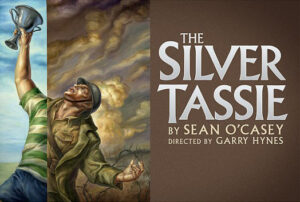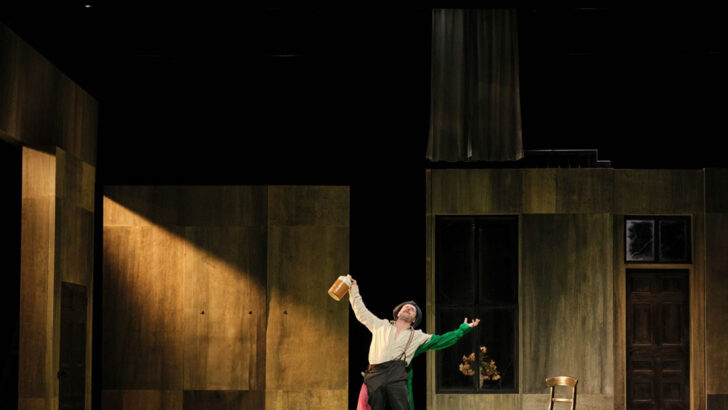Sean O’Casey’s Dublin trilogy – The Shadow of a Gunman (1923), Juno and the Paycock (1924) and The Plough and the Stars (1926) – was the first effort at demythologising the Irish revolution in the public sphere. As Conor Cruise O’Brien wrote, these plays “are not revolutionary, and are even counter-revolutionary in their implications and impact in the theatre, and his [O’Casey’s] revolutionary rhetoric is generally poppycock”.
The initial impact of the plays – in particular, of The Plough and the Stars which is set before and during the 1916 Rising – was electric, and The Plough famously provoked a riot in the Abbey Theatre. Yeats responded to the riot with his famous denunciation of the protesters from the stage of the theatre: “You have disgraced yourselves again”.
Druid
It is perhaps appropriate that the acclaimed Druid theatre company has decided to stage these three plays together at the close of the ‘Decade of Centenaries’. Indeed, one can actually see all three on the same day – as I did recently, at the Abbey Theatre where they were first performed in the 1920s.
Seeing them now allows us to adjust our perspective on the Irish revolution after the centenary commemorations, just as the original productions sounded a critical note so soon after the actual events.
The plays are a blend of humour, satire and tragedy – and the difficult, even implausible, transition from humour and satire into tragedy is skilfully achieved in all three plays. Nevertheless, their impact today is muted by the fact that we are less in thrall to the romantic notion of the Irish revolution than earlier audiences.
The advance in historical scholarship since the 1960s – so-called revisionism – has rescued the revolution from patriotic oversimplication and hero worship. Thus the Decade of Centenaries programme of commemorations was nuanced in ways that O’Casey could not have imagined – with an emphasis on reconciliation, inclusiveness and historical authenticity. One of the core principles guiding the programme was “not to forget the bloodshed and the deep antagonisms of these years [1912-1923]”.
O’Casey’s plays remind us of the bloodshed of the revolution and the hardships endured by ordinary people in the course of the revolution. We are also reminded – in The Shadow of a Gunman especially – of the “sneaking regarders”, those who admire and give support and succour to gunmen at a safe distance from the bloodshed and the hardships.
Bloodshed
That we still need to be reminded of the bloodshed and the hardships was evidenced by the spectacle of hordes of young people chanting “Ooh, ah, up the RA” with the Wolfe Tones at the Electric Picnic festival this year – another instance of disgracing ourselves again.
Our collective memories of life in the shadow of gunmen are all too short, apparently incapable of stretching back 100 years to the Irish revolution or even 25 years to before the Good Friday Agreement.
Bravo to Druid for staging O’Casey’s Dublin trilogy at this time. A shout-out, too, to An Post who earlier this year issued three beautiful stamps to mark the centenary of the plays, one stamp for each of the plays.
But what would O’Casey himself have wanted?
A comment by Peter Costello
Faced with an opportunity to see his set of plays about the Irish revolution performed as part of the decade of Remembrance, what would O’Casey have wanted?
He was always glad, as least on most occasions, to see his dramas performed, but these plays about revolution and war and the ruination they cause were not in his mind a trilogy, but a teratology (for which he had a good model in the history plays of Shakespeare).
The fourth play of the set was The Silver Tassie, which in counterpoint dealt with Dubliners’ experience of the Great War.

Yeats and the Abbey management rejected the play. O’Casey, Yeats suggested, had first hand experience of the revolutionary years in Dublin; but the trenches of the Western Front were not in his experience.
To this O’Casey would have said that he had personal knowledge of what the experience of the war did to the lives and minds of young Dubliners because he had seen the results among the men of the North side. He saw the play as absolutely essential to the truest and deepest understanding of the damage done the psyche Europe by the Great War.
Yeats’ view was widely shared. Already Ireland wished to believe that the Somme was not their battle (though it was clearly Belfast’s). Indeed that view is still very much alive in the country still.
While the series produced by the Druid deserves the praises heaped upon it, and will be further praised when it opens in the US next month, the production could have been the occasion at long last to do full justice to what O’Casey wanted.
Indeed Druid have produced the play on its own in the past. Why not now, as part of the set? Can we really praise his vision and insight, while continuing to reject one quarter of it?
This is a question that the more mature Ireland of the future will answer. But for now at this time of commemoration of lost lives The Silver Tassie is not to be seen.


 A scene from the present Druid production of O’Casey.
A scene from the present Druid production of O’Casey. 